
If Your Loved One Suffers from Addiction, You Suffer from Addiction
It’s a difficult paradigm to embrace, but if your family member suffers from addiction, you suffer from addiction as well. This may seem unfair since you’re not the person who is actually using drugs or drinking, but in reality, aspects of your life have become unmanageable because of your loved ones alcohol or drug use, and you are completely powerless over the choices your loved one is making.
If you are a loving spouse, it’s likely your life has been turned upside down by the lack of trust. You may fear financial, emotional, maybe even physical, insecurity. If you are a parent, how many heart-heavy nights have you spent angry and worried about the safety of your child? You want to help but don’t really know how. You hope for the best, envision the worst and wonder where you went wrong.
Although the roots of addiction reside in the mind and soul of someone addicted, the insidious nature of this disease is such that the branches and vines encircle, intertwine and enmesh, without mercy, the lives of innocent bystanders. Children, spouses, parents, siblings, even bosses and co-workers can be drawn into the black hole of an addicted person’s world.
So, when should family or loved ones decide it is time to take action? If you identify with the feelings described in the previous paragraph, it is already time to address what is going on. Don’t wait until things get worse for the addicted individual; things are bad enough for you to do something right now. There are a variety of responses and options from which to choose, but first and foremost you should immediately seek outside perspective by discussing your circumstances with a professional therapist. Living with a person who suffers from active addiction or alcoholism is a terribly isolating experience no one is prepared for. You are dealing with a complicated, life threatening, disease. Don’t assume you can figure it out on your own. Without professional help, you are ill-equipped to joust this dragon.
A therapist can help deepen your understanding of alcoholism and addiction, will help identify choices you can make to protect your own mental and emotional health, and give you the most important gift of all—hope. By seeking perspective and advice you’re already on the path of healing. Here is a paradox; as you heal from the effects of your loved one’s illness, you increase the possibility of them healing from it as well.










